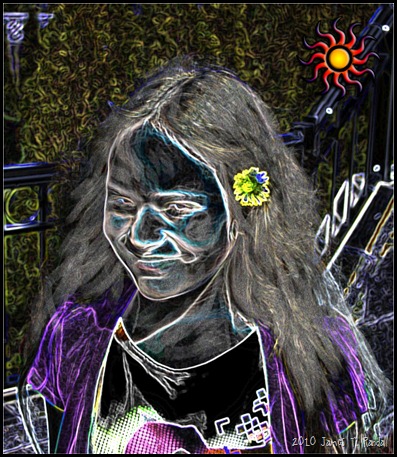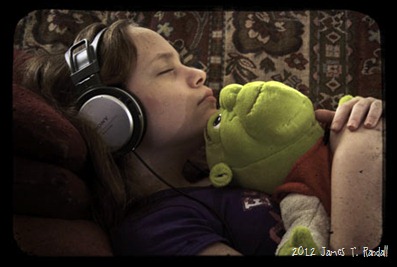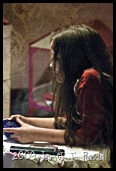How can I explain my daughter’s behaviour to others?
If I speak with any kind of harsh tone in my voice, approach quickly or at the wrong moment, move my hand in her general direction, say or imply something  she doesn’t like or agree with, she’ll freak out and start screaming as if she is in immediate mortal danger. Sometimes she will react with incredible hostility, stomping, yelling, swearing, or physically attacking me. Often even the slightest change in my facial expression can trigger her – a smile, frown, or grimace, whatever. This can happen at any time of the day or night and, due to her complete lack of circadian rhythm, often occurs at inappropriate hours (such as 2am). At other times she will freely engage in self-abusive behaviour in response to external stimuli most people would barely notice such as sound or light differences. It has taken years of extreme efforts to stop her from overtly inflicting physical pain and damage upon herself. Unfortunately, I became the ‘safe’ proxy target for expressing her rage towards. It was far easier to put up with her chewing on my arm than to bear the sight of her gouging at her own face. We’ve come a very long way since then.
she doesn’t like or agree with, she’ll freak out and start screaming as if she is in immediate mortal danger. Sometimes she will react with incredible hostility, stomping, yelling, swearing, or physically attacking me. Often even the slightest change in my facial expression can trigger her – a smile, frown, or grimace, whatever. This can happen at any time of the day or night and, due to her complete lack of circadian rhythm, often occurs at inappropriate hours (such as 2am). At other times she will freely engage in self-abusive behaviour in response to external stimuli most people would barely notice such as sound or light differences. It has taken years of extreme efforts to stop her from overtly inflicting physical pain and damage upon herself. Unfortunately, I became the ‘safe’ proxy target for expressing her rage towards. It was far easier to put up with her chewing on my arm than to bear the sight of her gouging at her own face. We’ve come a very long way since then.
 she doesn’t like or agree with, she’ll freak out and start screaming as if she is in immediate mortal danger. Sometimes she will react with incredible hostility, stomping, yelling, swearing, or physically attacking me. Often even the slightest change in my facial expression can trigger her – a smile, frown, or grimace, whatever. This can happen at any time of the day or night and, due to her complete lack of circadian rhythm, often occurs at inappropriate hours (such as 2am). At other times she will freely engage in self-abusive behaviour in response to external stimuli most people would barely notice such as sound or light differences. It has taken years of extreme efforts to stop her from overtly inflicting physical pain and damage upon herself. Unfortunately, I became the ‘safe’ proxy target for expressing her rage towards. It was far easier to put up with her chewing on my arm than to bear the sight of her gouging at her own face. We’ve come a very long way since then.
she doesn’t like or agree with, she’ll freak out and start screaming as if she is in immediate mortal danger. Sometimes she will react with incredible hostility, stomping, yelling, swearing, or physically attacking me. Often even the slightest change in my facial expression can trigger her – a smile, frown, or grimace, whatever. This can happen at any time of the day or night and, due to her complete lack of circadian rhythm, often occurs at inappropriate hours (such as 2am). At other times she will freely engage in self-abusive behaviour in response to external stimuli most people would barely notice such as sound or light differences. It has taken years of extreme efforts to stop her from overtly inflicting physical pain and damage upon herself. Unfortunately, I became the ‘safe’ proxy target for expressing her rage towards. It was far easier to put up with her chewing on my arm than to bear the sight of her gouging at her own face. We’ve come a very long way since then.
I have tried everything I can think of to help her to manage her unrealistic anger and fears. I have spent endless hours researching all aspects of special needs accommodation in hopes of gleaning a paltry few workable strategies. I have spoken to doctors about the problems many times without ever managing to convey the full compass of issues involved. Everyone seems to feel as if there is some help out there as they have heard anecdotal tales of useful services being delivered, but they have never been able refer me to where I may be able to seek assistance. Programs that supposedly exist, don’t. Legislation that directs government agencies to be responsive to this population is openly ignored. Behavioural programs specifically exclude those with disorders related to teratogenic developmental brain damage, preferring to address only those with certain types of acquired brain injury.
Sarah is not capable of thinking clearly, ever, about anything. People tend to view these types of problems as stemming from some kind of parental shortcoming. This has been the traditional viewpoint – blame the victim(s). As if some deep character flaw within the caregiver has instilled the dysfunctional behaviours. 

This situation didn’t come into existence over time, but is the way that Sarah has always been.
It goes from one extreme to the other. Either she is completely in love with the world and oblivious to every form of suffering within it, or she emotively feels the exact opposite and loathes everything entirely. The change can occur rapidly within the space of a single sentence. This isn’t bipolar disorder, rage syndrome, or any other simple singular psycho-emotional problem. Sarah’s spectrum of symptoms encompasses a multitude of similarities with many of the hardest to manage psycho-social disorders.
Her condition is not static. Once a routine develops and I think I know how/when/why her state will become dis-regulated, everything changes. Suddenly, one morning, her favourite things have shifted. The particular stimulus (sound, light, thought) which triggered her worst responses has changed. It can be very challenging to regularly wake up to a different child than the one that you put to bed. Constantly working to re-calibrating her environment to minimise negative reactions is an ongoing strategic game of charades. It’s a bit like playing a perpetual game of musical chairs wherein the seats are constantly being re-arranged and randomly added or removed, whilst blindfolded.
reactions is an ongoing strategic game of charades. It’s a bit like playing a perpetual game of musical chairs wherein the seats are constantly being re-arranged and randomly added or removed, whilst blindfolded.
 reactions is an ongoing strategic game of charades. It’s a bit like playing a perpetual game of musical chairs wherein the seats are constantly being re-arranged and randomly added or removed, whilst blindfolded.
reactions is an ongoing strategic game of charades. It’s a bit like playing a perpetual game of musical chairs wherein the seats are constantly being re-arranged and randomly added or removed, whilst blindfolded.
It’s a whole brain effect of the teratogenic organic damage that she has suffered from since before her birth and continued throughout her development to this day. The genetic damage was imprinted upon the earliest neural cells and every division has brought about haphazard structural differences at every stage of growth and development since.
I cannot change her. There is little or no therapeutic response to any type of medication for those who suffer from the effects of pre-natal alcohol exposure. She will not outgrow it, or miraculously develop the ability to live life normally. We face this reality head on, daily.
We don’t ask for a great deal of outside help. It would be nice to get some type of respite services, though. We could both really use a break from each other once  in a while. I imagine that it would take a long time to brief anyone on Sarah’s specific needs. I am woefully aware that no qualified caregiver relief personnel currently exist, or are being trained for deployment anytime in the near future.
in a while. I imagine that it would take a long time to brief anyone on Sarah’s specific needs. I am woefully aware that no qualified caregiver relief personnel currently exist, or are being trained for deployment anytime in the near future.
 in a while. I imagine that it would take a long time to brief anyone on Sarah’s specific needs. I am woefully aware that no qualified caregiver relief personnel currently exist, or are being trained for deployment anytime in the near future.
in a while. I imagine that it would take a long time to brief anyone on Sarah’s specific needs. I am woefully aware that no qualified caregiver relief personnel currently exist, or are being trained for deployment anytime in the near future.
…One can dream, though.